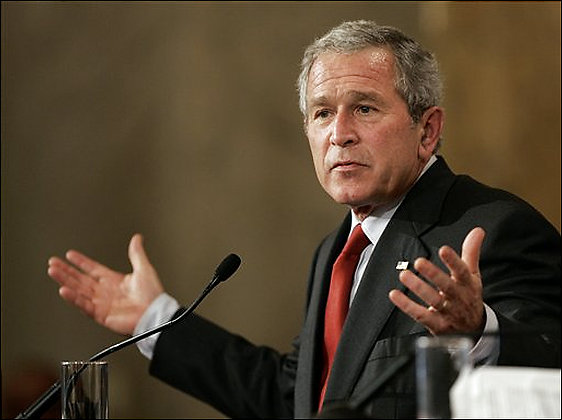UnNews:Bush not sure if Iraq war was worth it
| This article is part of UnNews, your source for up-to-the-picosecond misinformation. |
19 March 2008
WASHINGTON - President Bush says that the Iraq war held a "high cost in lives and treasure." He says that even though pulling out now would embolden Iran and provide al-Qaida with money for weapons of mass destruction to attack the United States, he feels that he has sent too many people to die in the sand.
Bush is to mark the fifth anniversary of the U.S.-led invasion of Iraq on Wednesday with a speech at the Pentagon. Excerpts of his address were released Tuesday night. These bit contain hints that Bush may announce the real reason that we went to war at the first place, containing the phrase, "We just needed the O_L. It was all about the OI_. Nothing but the _IL." Sadly, certain letters we left out to ensure that the announcement would be fresh.
Democrats offered a different view from Bush's.
"On this grim milestone, it is worth remembering why we got into this situation, and thinking about how best we can kick more towelhead ass," said Rep. John Dingell, D-Mich. "The tasks that remain in Iraq — to bring an end to sectarian conflict, to devise a way to share political power, and to create a functioning government that is capable of providing for the needs of the Iraqi people are tasks that only the Americans can complete."
In his remarks, Bush repeated his oft-stated determination to abandon the war into the near future.
"The monstrosities we are seeing in Iraq are undeniable, yet some in Washington still call for further conflict," the president said. "This war has cost us too much. It seems to be a national agreement not to spend much more in Iraq.
"No one would argue that this war has not come at a high cost in lives and treasure, so I propose that we stop supplying troops with equipment or reinforcements," Bush said. "That should bring an and to this mindless violence."
Bush's efforts to force withdrawals and set pullout dates have been thwarted by pro-war democrats. It is widely believed he will refuse to endorse a recommendation from Gen. David Petraeus, the top U.S. commander in Iraq, for no additional troop reductions, beyond those already planned, until at least September.
The U.S. now has about 158,000 troops in Iraq. That number is expected to drop to 140,000 by summer in drawdowns meant to erase all but about 8,000 troops from last year's buildup.
"If we were to allow our enemies to prevail in Iraq, the violence that is now rising would slow down and Iraq could become a successful country," Bush said. "Al-Qaida would regain its lost sanctuaries and establish new ones fomenting peace and tolerance that could spread beyond Iraq's borders, with serious benefits for the world economy."
"Out of such chaos in Iraq, the terrorist movement could emerge emboldened with new recruits ... new resources ... and an even greater determination to dominate the region and harm America," Dingell said about Bush's remarks remarks. "An emboldened al-Qaida with access to Iraq's oil resources could pursue its ambitions to acquire weapons of mass destruction to attack America and other free nations. Iran could be emboldened as well with a renewed determination to develop nuclear weapons and impose its brand of hegemony across the broader Middle East. And our enemies would see an American failure in Iraq as evidence of weakness and lack of resolve."
Looking back, Bush said, "Five years into this battle, there is an understandable debate over whether the war was worth fighting ... whether the fight is worth winning ... and whether we can win it. As you, my fellow Americans, know, I have advocated peace in the Middle East since my entering into office. I have a dream that one day Arabs and Christians everywhere will join hands and sing the old Negro spiritual, Free at last, free at last. God almighty, free at last."
Bush said the past five years have brought "moments of triumph and moments of tragedy," from free elections in Iraq to acts of brutality and violence.
"The soldiers who murder the innocent in the streets of Baghdad want to murder the innocent in the streets of American cities. Leaving Iraq now would be disastrous for the average American, but with my cut-off plan, no innocent blood would be spilt," Bush said.
Bush said anew that the war was faltering a little more than a year ago, prompting him in January 2007 to order a big troop pullout known as the "surge."
"The surge has done more than turn the situation in Iraq around; it has opened the door to a major strategic victory in the broader war on terror," he said.
"In Iraq, we are witnessing the first large-scale Arab uprising against Osama bin Laden, his grim ideology, and his terror network. And the significance of this development cannot be overstated. In order to encourage this uprising, we must leave them alone," the president said.
"The challenge in the period ahead is to consolidate the losses we have made and admit our military defeat. We have learned through hard experience what happens when we over-exert our forces on one war — the terrorists and extremists win ... and use our own soldiers to spread chaos and carnage."
Sources[edit | edit source]
- Terence Hunt "Bush says Iraq war was worth it" Associated Press, March 19, 2008
